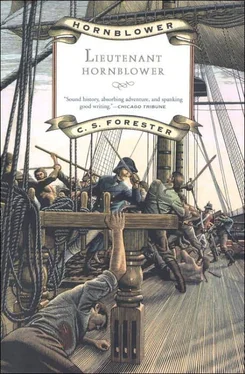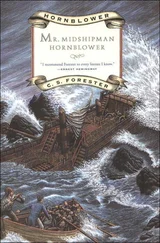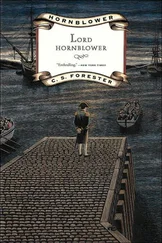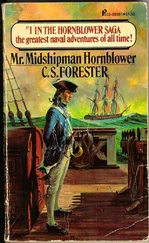“I see,” said Bush again, and he remembered Hornblower standing by the furnace in Fort Samaná organizing the firing of redhot shot at the Spanish privateers.
“The life is not entirely one of beer and skittles, naturally,” went on Hornblower; with the dam once broken he could not restrain his loquacity. “After the fourth hour or so it becomes irksome to play with bad players. When I go to Hell I don’t doubt that my punishment will be always to partner players who pay no attention to my discards. But then on the other hand I frequently play a rubber or two with the good players. There are moments when I would rather lose to a good player than win from a bad one.”
“That’s just the point,” said Bush, harking back to an old theme. “How about the losses?”
Bush’s experiences of gambling had mostly been of losses, and in this hardheaded moment he could remember the times when he had been weak.
“I can deal with them,” said Hornblower. He touched his breast pocket. “I keep ten pounds here. My corps de réserve , you understand. I can always endure a run of losses in consequence. Should that reserve be depleted, then sacrifices have to be made to build it up again.”
The sacrifices being skipped meals, thought Bush grimly. He looked so woebegone that Hornblower offered further comfort.
“But five more months,” he said, “and I’ll be on half pay again. And before that—who knows? Some captain may take me off the beach.”
“That’s true,” said Bush.
It was true insofar as the possibility existed. Sometimes ships were recommissioned. A captain might be in need of a lieutenant; a captain might invite Hornblower to fill the vacancy. But every captain was besieged by friends seeking appointments, and in any event the Admiralty was also besieged by lieutenants of great seniority—or lieutenants with powerful friends—and captains were most likely to listen to recommendations of high authority.
The door opened and a group of men came in.
“It’s high time for customers to arrive,” said Hornblower, with a grin at Bush. “Stay and meet my friends.”
The red coats of the army, the blue coats of the navy, the bottlegreen and snuffcoloured coats of civilians; Bush and Hornblower made room for them before the fire after the introductions were made, and the coattails were parted as their wearers lined up before the flames. But the exclamations about the cold, and the polite conversation, died away rapidly.
“Whist?” asked one of the newcomers tentatively.
“Not for me. Not for us,” said another, the leader of the redcoats. “The TwentyNinth Foot has other fish to fry. We’ve a permanent engagement with our friend the Marquis in the next room. Come on, Major, let’s see if we can call a main right this time.”
“Then will you make a four, Mr. Hornblower? How about your friend Mr. Bush?”
“I don’t play,” said Bush.
“With pleasure,” said Hornblower. “You will excuse me, Mr. Bush, I know. There is the new number of the Naval Chronicle on the table there. There’s a Gazette letter on the last page which might perhaps hold your interest for a while. And there is another item you might think important, too.”
Bush could guess what the letter was even before he picked the periodical up, but when he found the place there was the same feeling of pleased shock to see his name in print there as keen as the first time he saw it: ‘I have the honour to be, etc., WM. BUSH.
The Naval Chronicle in these days of peace found it hard, apparently, to obtain sufficient matter to fill its pages, and gave much space to the reprinting of these despatches. ‘Copy of a letter from ViceAdmiral Sir Richard Lambert to Evan Nepean, Esq., Secretary to the Lords Commissioners of the Admiralty.’ That was only Lambert’s covering letter enclosing the reports. Here was the first one—it was with a strange internal sensation that he remembered helping Buckland with the writing of it, as the Renown ran westerly along the coast of Santo Domingo the day before the prisoners broke out. It was Buckland’s report on the fighting at Samaná. To Bush the most important line was ‘in the handsomest manner—under the direction of Lieutenant William Bush, the senior officer, whose report I enclose’. And here was his very own literary work, as enclosed by Buckland.
HMS Renown, off the Santo Domingo. January 9th, 1802
SIR,
I have the honour to inform you…
Bush relived those days of a year ago as he reread his own words: those words which he had composed with so much labour even though he had referred, during the writing of them to other reports written by other men so as to get the phrasing right.
…I cannot end this report without a reference to the gallant conduct and most helpful suggestions of Lieutenant Horatio Hornblower, who was my second in command on this occasion, and to whom in great part the success of the expedition is due.
There was Hornblower now, playing cards with a post captain and two contractors.
Bush turned back through the pages of the Naval Chronicle . Here was the Plymouth letter, a daily account of the doings in the port during the last month.
’Orders came down this day for the following ships to be paid off....’ ‘Came in from Gibraltar La Diana , 44, and the Tamar , 38, to be paid off as soon as they go up the harbour and to be laid up.’ ‘Sailed the Caesar , 80, for Portsmouth, to be paid off.’ And here was an item just as significant, or even more so: ‘Yesterday there was a large sale of serviceable stores landed from different men of war.’ The navy was growing smaller every day and with every ship that was paid off another batch of lieutenants would be looking for billets. And here was an item—‘This afternoon a fishing boat turning out of atwater jibed and overset, by which accident two industrious fishermen with large families were drowned.’ This was the Naval Chronicle , whose pages had once bulged with the news of the Nile and of Camperdown; now it told of accidents to industrious fishermen. Bush was too interested in his own concerns to feel any sympathy towards their large families.
There was another drowning as a final item; a name—a combination of names—caught Bush’s attention so that he read the paragraph with a quickened pulse.
Last night the jolly boat of His Majesty’s cutter Rapid , in the Revenue service, while returning in the fog from delivering a message on shore, was swept by the ebb tide athwart the hawse of a merchantman anchored off Fisher’s Nose, and capsized. Two seamen and Mr. Henry Wellard, Midshipman, were drowned. Mr. Wellard was a most promising young man recently appointed to the Rapid , having served as a volunteer in His Majesty’s ship Renown .
Bush read the passage and pondered over it. He thought it important to the extent that he read the remainder of the Naval Chronicle without taking in any of it; and it was with surprise that he realised he would have to leave quickly in order to catch the carrier’s waggon back to Chichester.
A good many people were coming into the Rooms now; the door was continually opening to admit them. Some of them were naval officers with whom he had a nodding acquaintance. All of them made straight for the fire for warmth before beginning to play. And Hornblower was on his feet now; apparently the rubber was finished, and Bush took the opportunity to catch his eye and give an indication that he wished to leave. Hornblower came over to him. It was with regret that they shook hands.
“When do we meet again?” asked Hornblower.
“I come in each month to draw my half pay,” said Bush. “I usually spend the night because of the carrier’s waggon. Perhaps we could dine—?”
Читать дальше









